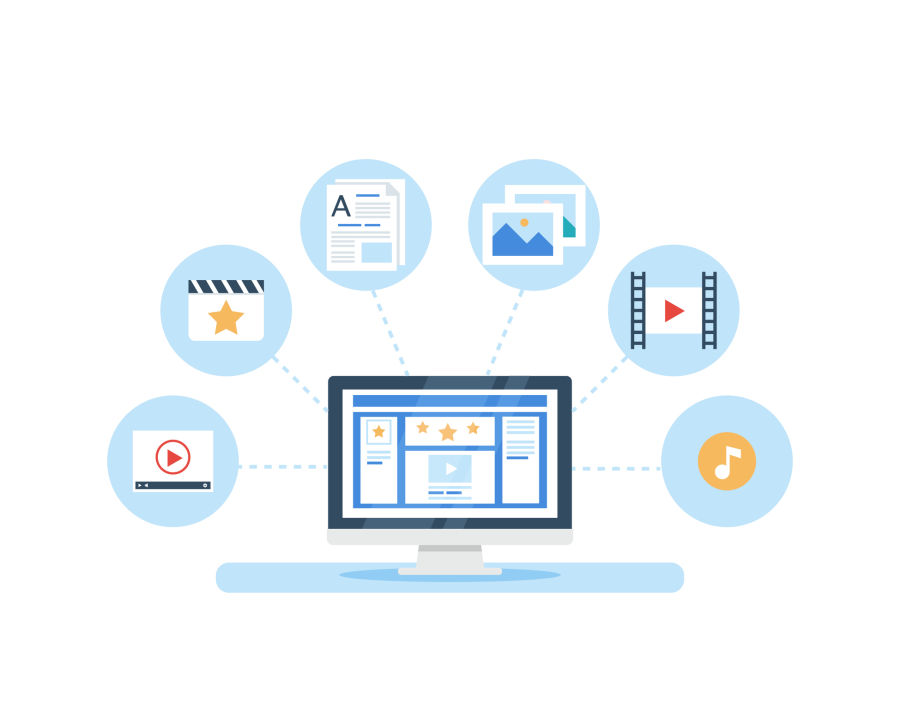//
Sep 4, 2022
Does My Business Need a CRM or a CMS?
Today we’re going to address two of these jumbles of letters—CRM and CMS.
We'll address how they interact with, and complement each other, and ultimately, together, become an integral part of your sales and marketing arsenal to obtain, and keep customers.
Customer Relationship Management (CRM)

Kind of self-explanatory (after you discover what the acronym stands for!), a analyzes data in order for your company to manage customer data gathered and allows you to interact with potential and current clients to further develop your relationships with them. This makes a CRM an integral component of any inbound marketing strategy to house your incoming data for leads generated via web forms.
CRM's Empower your Inbound Sales Team
Before the internet, salespeople relied on phone calls and in-person meetings to develop a leads list. All sorts of opportunities slipped through the cracks due to:
- Unreliable contact information
- Forgotten follow-up calls
- Not being able to keep track of who said what in which meeting
- Salespeople overlapping or duplicating efforts in the lead generation phase
- No access to their leads list when a salesperson leaves
A CRM system allows all your salespeople to enter the information they used to spend hours entering customer information onto siloed spreadsheets (or napkins, in some cases!), into one centralized place on your company’s intranet. Anyone can input, access, update and view any record in the system to find out specific data about potential and existing customers. If the system is cloud-based, this information is available at your fingertips, on any of your connected mobile devices.
And as an added bonus, interactions and nuggets of information from customer meetings can be tracked and stored in your CRM system and shared with colleagues. After all, you have a sales “team”—right? Your entire team will have available, literally at their fingertips:
- Phone calls made
- Emails sent
- Meetings scheduled
- Presentations delivered
- Customer preferences
- Past orders and purchases
- Next steps notes
The Power of Customer Data
Don’t let the word “analytics” scare you when it comes to viewing and understanding the data that’s gathered in your CRM system. You don’t need the IQ of Einstein or need to recruit an IT interpreter. A CRM system worth its salt will provide you with invaluable information through visual, easy-to-read dashboards where you can select and customize the data you want to be pulled together on any particular contact in the system in order to best approach or reach out to that customer.
Since social media presence is a “must” for any business to stay competitive and visible in the digital marketplace today, your CRM system is also capable of compiling the social media behaviors of each contact in your system. Beyond that, there are many key features included with most CRMs like and .
The key features of a CRM include:
- Contact Management Database: CRMs, at their core, are meant to serve as a single source of truth to all of your contact communications. Whether that is with prospects, leads, or customers, a CRM is capable of recording their personal and company information while logging emails, calls, and internal notes for your reference.
- Activity Tracking: Beyond logging communications, when a CRM is integrated with your website you can access data regarding what pages your contacts have viewed, which forms they've filled out, how they found your website, and nearly any digital interaction your contacts experience with your business.
- Lead Funnel Management: CRMs often come with automated marketing tools to score and qualify leads from when they are first generated to when they move through your funnel to become a paying customer. Since every sales model is different, CRMs enable you to determine each stage in the funnel so that your sales team gets in touch with leads that are most likely to convert.
- Email Management: Whether you're sending personalized sales emails or automated marketing emails, CRMs will log emails sent, delivered, opened, and clicked on to call out your most engaged contacts. Email deliverability is also often included for you to have everything on one platform for contact communications.
- Analytics and Reporting: Track and report on where your deals are in the funnel and your results in losing and closing them.
Content Management System (CMS)

Like a CRM gathers and helps manage customer data to help build better relationships with those customers, a manages your company’s digital content that is distributed through your website. As part of your inbound marketing strategy, you'll need some type of website development environment to host things like forms to generate leads. A CMS is an easy solution to accomplish this without much help needed from a developer.
There is an endless amount of online platforms offering CMS out there. Finding the one that's right for your business will depend on how you intend to develop and scale your content to improve your website's visibility. Marketing agencies, like Watermark, have experience working with a plethora of CMS platforms. Consider one of the top options identified by our team .
Things to consider when choosing a CMS:
- Price: There are popular CMS platforms, like WordPress, which are free. However, upgrades and desired customizations will often result in additional costs. Since websites can scale over time, it's okay to go with the cheapest option at first and move on to something more expensive or make an early investment in a platform that's going to be sustainable.
- Setup and Launch Speed: Many businesses need to have their start with a website launch and have no time to waste on designing customizations. For those cases, there are many CMS platforms, such as Squarespace, that have been optimized for ease of use, resulting in the ability to quickly launch and make changes to your website.
- Integrated Technologies: If you are already using digital marketing software, you may want to look into whether or not your CMS has built-in integration with you CRM, for example. There are even some CRM's, like Hubspot, which have their own .
- Maintenance: Quality ease of use for your CMS will help you maintain it without a developer. However, that may impact your CMS ability to be customizable. If you do have a developer dedicated to your website, it's important that you choose a platform that they are experienced in or are comfortable learning to make necessary fixes to your website.
- Security: No company is immune to hackers, it's important to make sure your CMS has security systems in place that are compliant with all information safeguards. Less popular and niche CMS platforms can be more secure with hackers more likely CMS platforms running more sites on the web.
Content Drives Conversations
A CMS application built into your website ensures that updates, additions and changes can easily be made by an internal content manager, rather than having to submit every web update to an external web designer/developer (which, in most cases, results in a website that stagnates with no updates applied for months, or even years).
It makes the most sense to have one individual be deemed as your company’s “” in order to ensure consistency of messaging and content style when something is changed and/or updated on your website. And these updates should happen on a consistent, ongoing basis. After all, nowadays, your company’s website is (and should be) the “hub” for your overall branding and marketing efforts.
Everyone on your team should be encouraged to contribute to updates, blogs, and other information that will provide valuable information through your website, to those who you want to target.
A CMS also allows you to incorporate a short contact form on your website, to obtain key information about people visiting your website. Don’t overload the form with too many questions (people are suspicious of giving too much information online to a company they are not familiar with or have not established a working relationship with yet). When a simple form that asks for name, email address, and a field to provide specific request details is filled out and sent, a prompt personalized follow-up email addressing/answering the specific details that were submitted. Voila—a bona fide “hot lead” to be acted on.
How to use CRM and CMS for Your Business
A CMS on your website helps attract leads. A CRM manages those leads. Together, these valuable tools increase business, establish your company as a reputable source, and puts you at the top of your customer’s minds when they are looking for something that your company can provide.
Leads obtained from the contact form on your website are transferred from the CMS to the CRM. You then can review that lead, and use the data from your CRM to analyze and determine if that lead is a good fit, and how best to take the next step and reach out to them.
You can't have inbound marketing without a powerful CRM to back it up!
Not 100% on what a CRM can do for your business? Watermark is offering free self-serve training videos to guide you on how a CRM can enhance your sales and marketing teams.
Trust the Marketing Experts at Watermark
Now that you understand the difference between CRM and CMS systems, it’s time to optimize each platform for your company’s specific needs. At Watermark, we follow best practices to create customized sites using the CMS system that best suits your needs, and help manage your CRM system to ensure that you’re getting the most benefit from your leads. Consider a free consultation to have our team walk you through each platform solution for your business.







